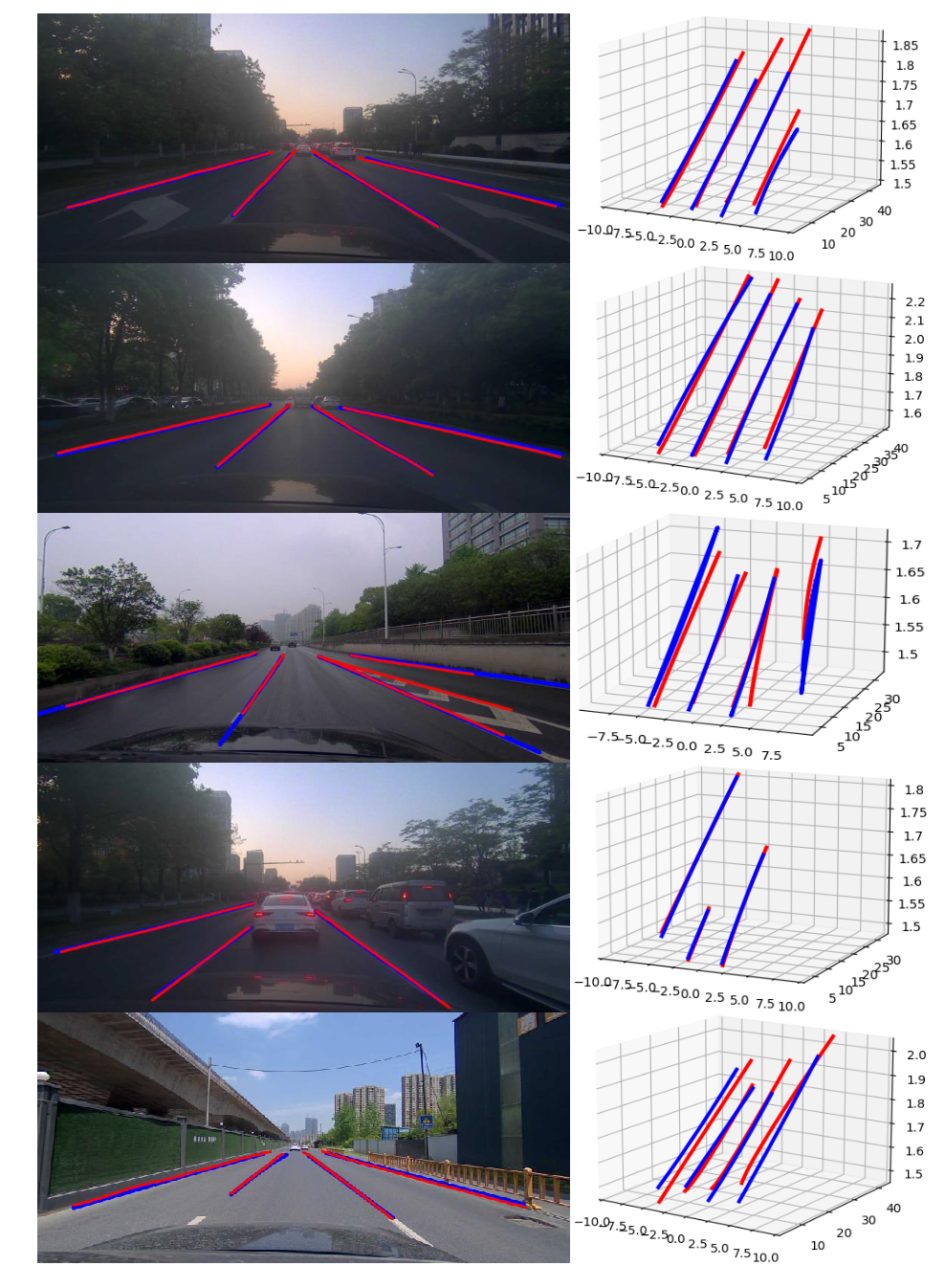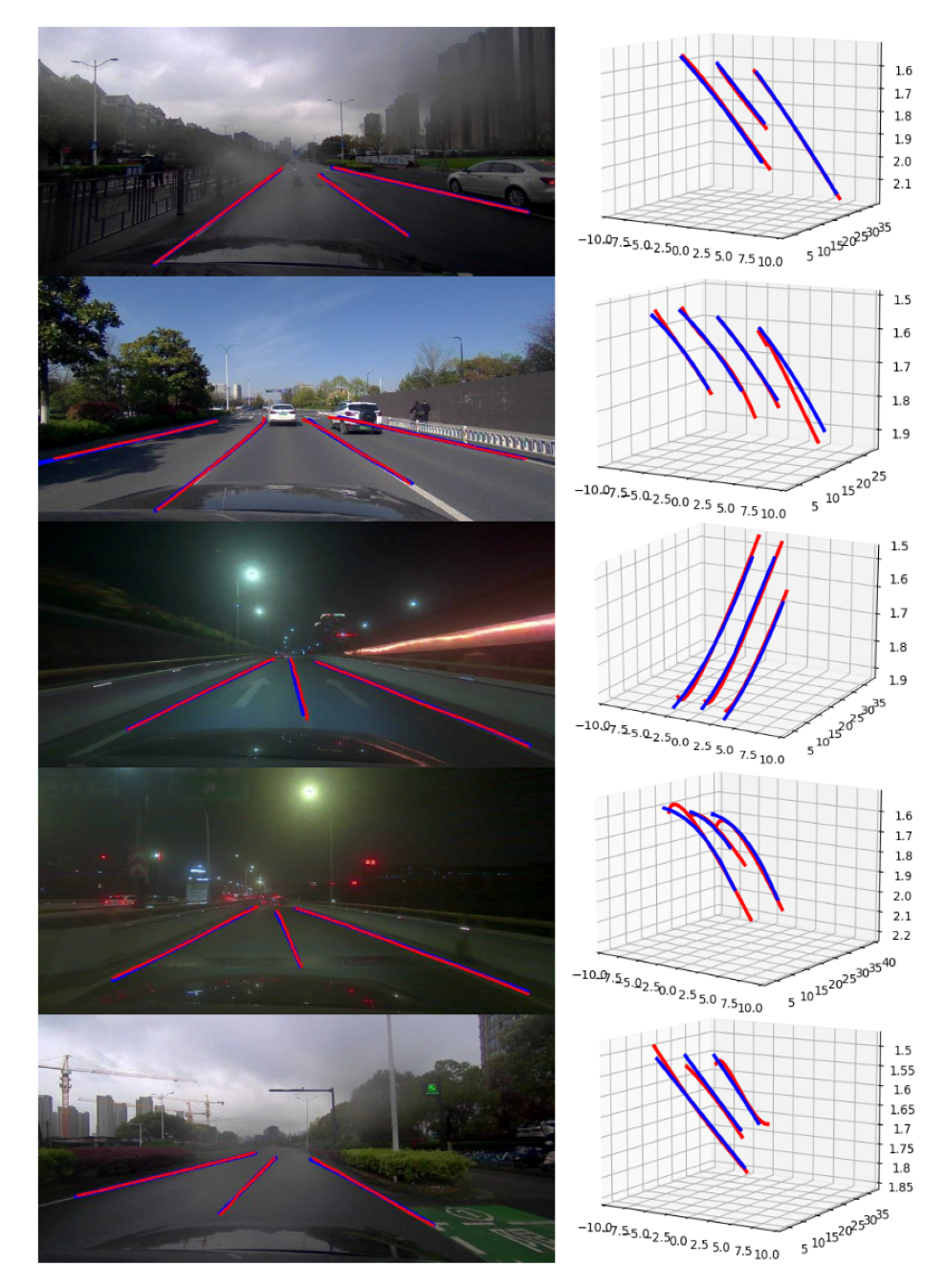Project Page | Paper | Data
ONCE-3DLanes: Building Monocular 3D Lane Detection
Fan Yan1 Ming Nie1 Xinyue Cai2 Jianhua Han2 Hang Xu2
Zhen Yang2 Chaoqiang Ye2 Yanwei Fu1 Michael Bi Mi2 Li Zhang 1
1School of Data Science, Fudan University 2Huawei Noah's Ark Lab
We present ONCE-3DLanes, a real-world autonomous driving dataset with lane layout annotation in 3D space. Conventional 2D lane detection from a monocular image yields poor performance of following planning and control tasks in autonomous driving due to the case of uneven road. Predicting the 3D lane layout is thus necessary and enables effective and safe driving. However, existing 3D lane detection datasets are either unpublished or synthesized from a simulated environment, severely hampering the development of this field. In this paper, we take steps towards addressing these issues. By exploiting the explicit relationship between point clouds and image pixels, a dataset annotation pipeline is designed to automatically generate high-quality 3D lane locations from 2D lane annotations in 211K road scenes. In addition, we present an extrinsic-free, anchor-free method, called SALAD, regressing the 3D coordinates of lanes in image view without converting the feature map into the bird's-eye view (BEV). To facilitate future research on 3D lane detection, we benchmark the dataset and provide a novel evaluation metric, performing extensive experiments of both existing approaches and our proposed method.
The aim of our work is to revive the interest of 3D lane detection in a real-world scenario. We believe our work can lead to the expected and unexpected innovations in both academia and industry.
You can refer to here to get more details of our dataset.
- python 3.6, pytorch 1.4, CUDA 10.2
git clone https://github.com/once-3dlanes/once_3dlanes_benchmark.git
conda create -n once3dlanes python=3.6.9
conda activate once3dlanes
pip install -r requirements.txt-
You can refer to here to download the official ONCE-3DLanes dataset.
-
The
frame.jsonfile of predicted 3D lanes should be organized like this:
{
"lanes":[
# One lane
{
"points": [
# The [x, y, z] coordinates of key points in the lane are listed as follows.
[-2.475, 1.871, 31.082],
[-2.547, 1.854, 28.394],
...
],
"score": 1, #The value doesn't affect evaluation.
},
# Other lanes
...
]
}- The final data structure should be:
once_3dlanes_benchmark
├── ONCE_3DLanes
│ ├── train
│ │ │── sequence
│ │ │ │──cam01
| | | | |──frame.json
| | | | |──...
│ ...
├── pred_dir
│ ├── sequence
│ │ │ │──cam01
| | | | |──frame.json
| | | | |──...
│ ├── ...
├── ...
├── eval.py
├── eval.sh
You should refer to the eval.sh and change your root、 gt_dir and pred_dir path.
Take the final data structure for example, the root = './once_3dlanes_benchmark', 'gt_dir = ONCE_3DLanes/train'and the pred_dir = 'pred_dir'.
bash eval.shPlease cite this paper in your publications if it helps your research:
@InProceedings{yan2022once,
title={ONCE-3DLanes: Building Monocular 3D Lane Detection},
author= {Yan, Fan and Nie, Ming and Cai, Xinyue and Han, Jianhua and Xu, Hang and Yang, Zhen and Ye, Chaoqiang and Fu, Yanwei and Bi Mi, Michael and Zhang, Li},
booktitle={Proceedings of the IEEE/CVF Conference on Computer Vision and Pattern Recognition},
year={2022},
}

